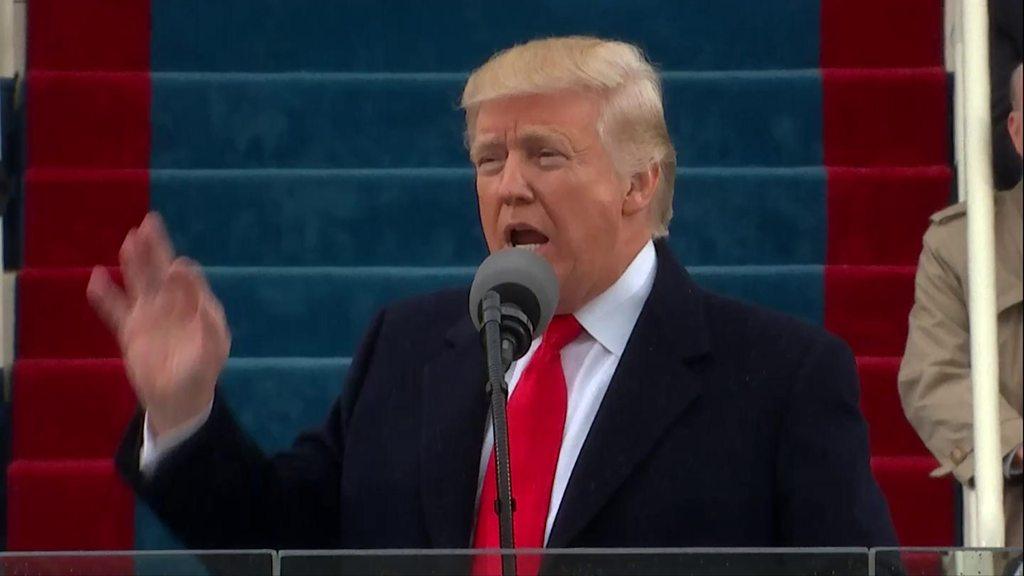George Floyd death: China takes a victory lap over US protests
- Published
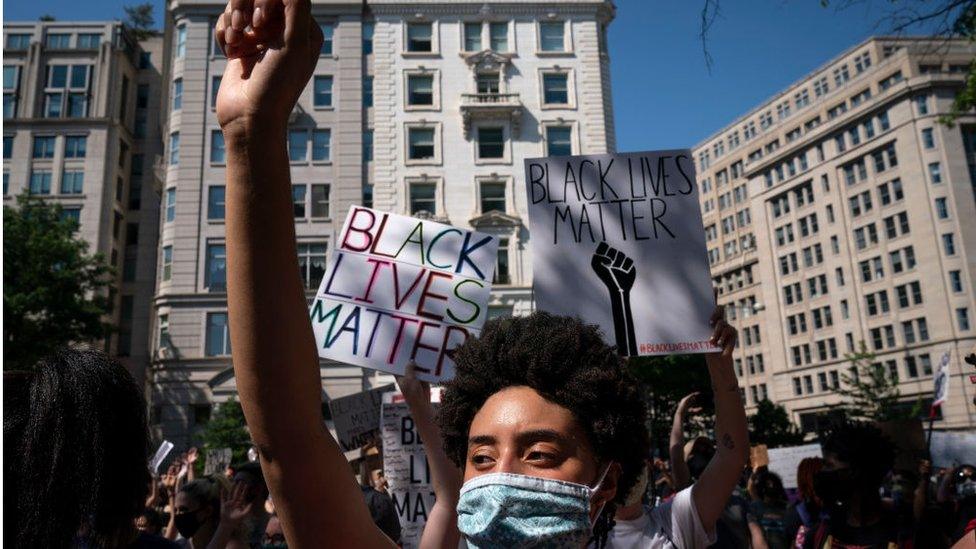
Demonstrators outside of the Trump International Hotel in Washington DC
The US mass protests are raising eyebrows around the world, but China is watching with particular interest.
As anti-racism protests sweep across the US, Beijing has seized upon them to hit back at Washington for supporting last year's Hong Kong pro-democracy demonstrations.
Chinese state media have given extensive coverage to the protests, highlighting the chaotic scenes and alleged police brutality in America to claim that China enjoys greater social stability.
Speaking to an international audience, Chinese diplomats are attempting to portray Beijing as a responsible global leader, standing in solidarity with other countries in condemning the racial disparity and injustice in the US.
'A beautiful sight'
China's state news agency Xinhua described the US civil unrest as "Pelosi's beautiful landscape" - a reference to US House Speaker Nancy Pelosi's comment last summer that the Hong Kong protests were "a beautiful sight to behold".
State media Global Times' chief editor Hu Xijin wrote that American politicians now can "enjoy this sight from their own windows".
Beijing has long condemned American politicians, including Ms Pelosi, for "glorifying violence" coming from the Hong Kong demonstrators, who are categorised by China as "rioters showing signs of terrorism".
Protests paralysed Hong Kong for most of last year, prompting Beijing to impose a new national security law in the territory in May, only two weeks ahead of the anniversary of the Tiananmen Square crackdown.
Aynne Kokas, senior faculty fellow with the University of Virginia's Miller Center for Public Affairs, says that both the US and China are contending with a high level of domestic instability triggered by the global coronavirus pandemic and political events.
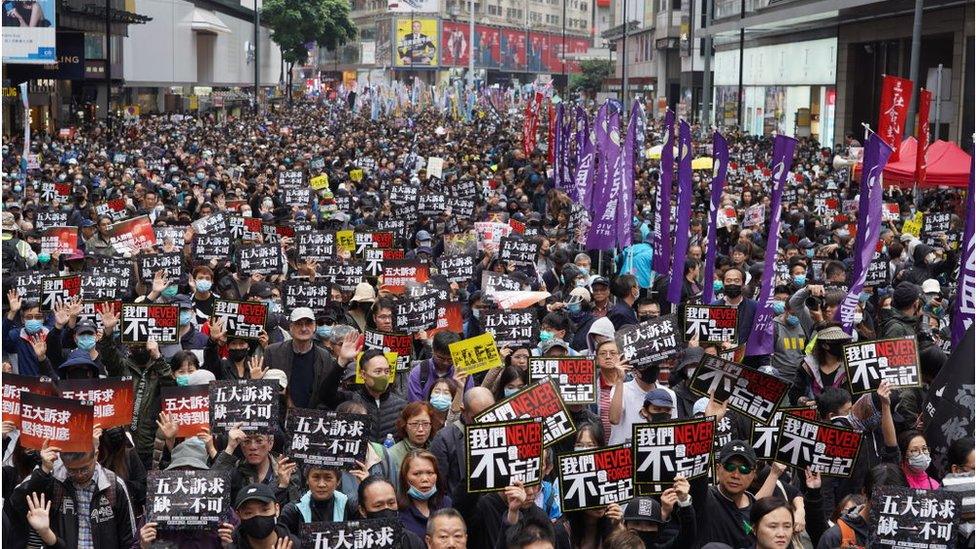
Tens of thousands marched in Hong Kong in Janaury
"Now is a key moment through which China is able to leverage the lack of stability in the US, in order to more efficiently promote its own national security goals," she says.
Criticism over US applying 'double standard'
Chinese and Hong Kong officials have also called out the US for applying "double standards" in its response to civil unrest.
"You know there are riots in the United States and we see how local governments reacted," said Hong Kong's leader Carrie Lam.
"And then in Hong Kong, when we had similar riots, we saw what position they adopted then."
The officials' view is shared by many Chinese social media users, who dub America "the double standard nation".
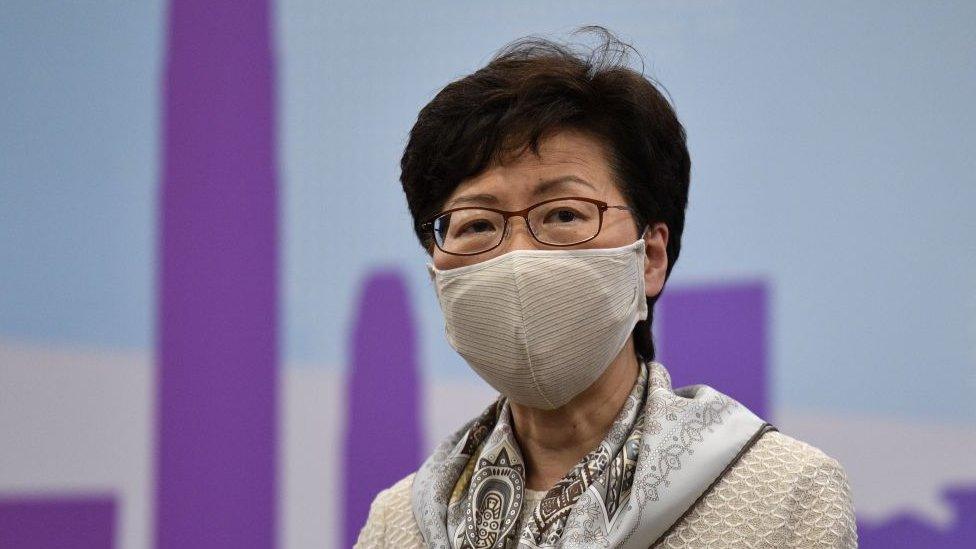
Hong Kong's leader Carrie Lam
Allegations of excessive use of police force during the US protests have been put under the spotlight by Chinese state media, to delegitimise Washington's position on upholding freedom and democracy.
In one example, state broadcaster China Central Television reported on American journalists being pepper sprayed and a freelance photographer partially blinded by a rubber bullet while covering the protests.

More from Zhaoyin

Georgia State University Global Communication Assistant Professor Maria Repnikova says that the scale and intensity of Chinese state media coverage on the US protests is unprecedented.
"It's powerful, because they are not making it up," Prof Repnikova says, but she points out that Chinese state media have cherry-picked the more peaceful pictures of Hong Kong police and the most violent ones from the US.

Journalists from across the US have reported being targeted by police at protests
China itself has been heavily criticised for cracking down on press freedom, which is rarely mentioned by the government and state media.
On Weibo, many see America's freedoms and democracy as at risk, as police fired tear gas at peaceful protesters and military was deployed to quell the protests.
Ms Kokas says: "Chinese state media don't have to craft a narrative, they can just talk about the objective events that have happen in Washington DC, that undermines the very principle of freedom of speech and freedom of assembly."
The US's rhetoric about the democratic rights of Hong Kong now seems "very hollow",she adds, "when military helicopters are flying over [Washington] DC".
Chinese diplomats condemn US racism
The increasingly outspoken Chinese diplomats have seized the chance to spotlight the US's governing failure and promote Beijing as a more responsible global leader.
Ms Kokas describes this as a continuation of the country's propaganda strategy on the Covid-19 pandemic - when America fails, China is here to help.
Chinese diplomats on Twitter retweeted messages of UN and African Union officials, condemning racial discrimination and police brutality in the US.
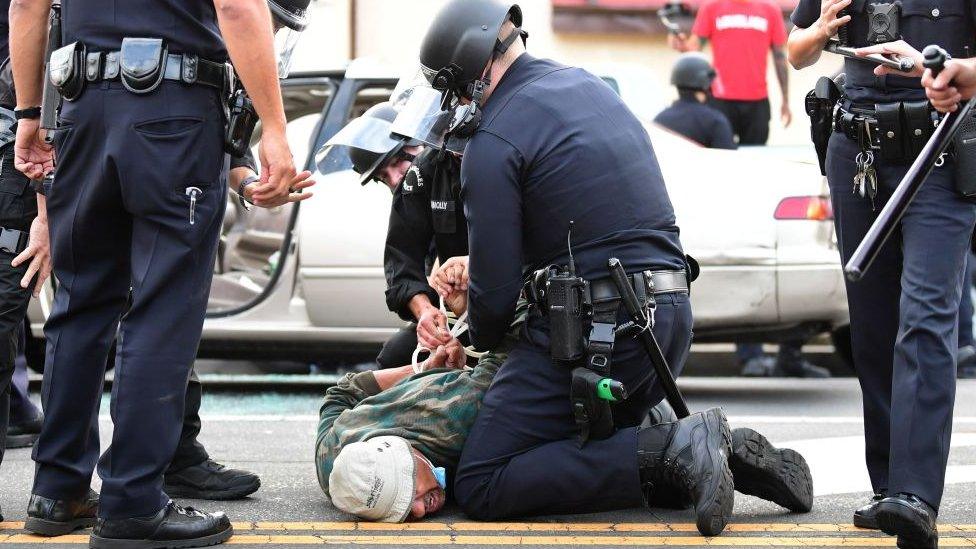
The Chinese foreign ministry spokeswoman Hua Chunying tweeted "I can't breathe", with a screencap of the US state department spokeswoman Morgan Ortagus' previous criticism over Beijing's handling in Hong Kong.
But another of Hua's messages denouncing anti-black racism backfired on Twitter, as she included "all lives matter", a phrase often used to undermine the "black lives matter" movement.
Meanwhile, there are reports that African residents in the southern Chinese city of Guangzhou have been discriminated against and forced into quarantine during the coronavirus pandemic.
Beijing has not officially apologised for any mishandling, only stating that there were some "misunderstandings".
One Weibo user expresses "disappointment", as the person sees "some Chinese criticise others for racial discrimination, but when it comes to their own anti-black racism, they take it for granted".
China is also accused of detaining hundreds of thousands of Uighurs and other Muslim minorities in high-security prison camps in its far western Xinjiang region.
Anti-America sentiment on the rise
There's no doubt US protests have sparked heated discussion on Weibo - the topic is one of the most popular on the site this week. Related posts have earned more than 25 billion views.
Many Weibo posts "congratulate" the US for the civil unrest and push back at its support for the Hong Kong demonstrations.
One user writes: "The US government has been inflaming violence around the world, now the American people have finally woken up. The US government deserves this!"
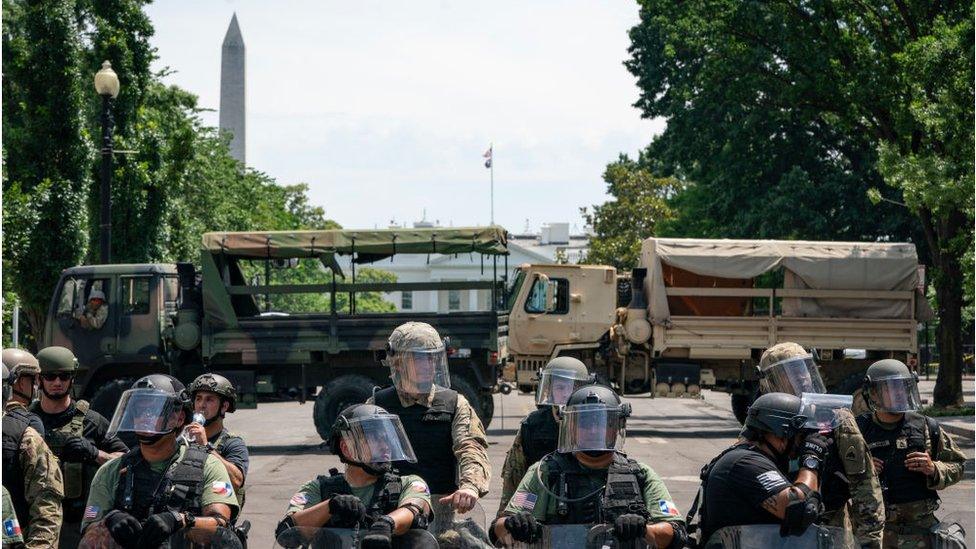
And Beijing and its state media spread the theory that Washington was fomenting the protests in Hong Kong, calling it a "black hand" behind the unrest.
As US-China relations have soured due to the Hong Kong protests, trade conflicts and the pandemic, anti-America sentiment appears to be on the rise in China.
Thousands of Weibo comments describe the US protests as "karma" for Washington.
But some Chinese seem genuinely saddened by the situation.
"This is trampling on human rights! Democracy in the US came to an end at this exact moment," a Weibo user commented under a video showing the CNN reporter getting arrested, receiving thousands of likes.
Many on Weibo also voice support for the civil rights movement. "Nothing much has changed after generations of fights. I hope this time will yield better results," a comment reads.
Some Chinese also reflect on the weaknesses of their country.
One Weibo user writes about being "envious of the freedom of expression" in the US, as anti-government protests are often forcefully cracked down in China.
Some posts urge the state media to cover China's domestic police violence and injustice with the same level of dedication.
But liberal voices are often met with harsh criticism.
State-affiliated yet liberal leaning newspaper Beijing News published a commentary advocating for empathy and respect for the American people, but it was quickly slammed as taking a "pro-America" stance and received tens of thousands of negative comments on Weibo.
Social media has always been an imperfect window to observe China's public opinion. Its echo chamber effect is exacerbated by the country's information censorship.
Prof Repnikova says that the relatively liberal views may become even more marginalised on Chinese social media, as cyber nationalism, a combination of bottom-up sentiments and top-down propaganda tactic, is increasingly dominant on the sites.
"The more aggressive, nationalistic and vocal voices are taking over the space," she says.
Additional reporting by Yitsing Wang
- Published4 June 2020
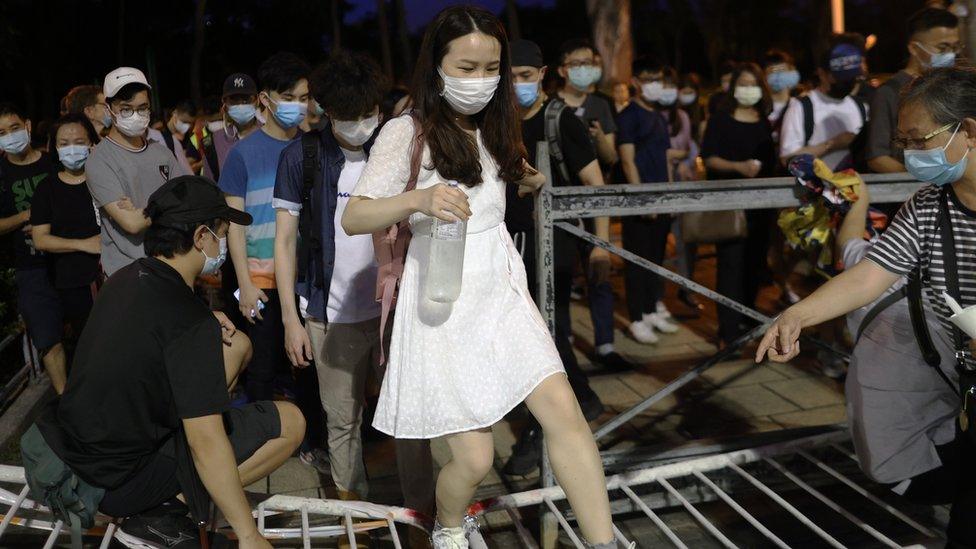
- Published31 May 2020
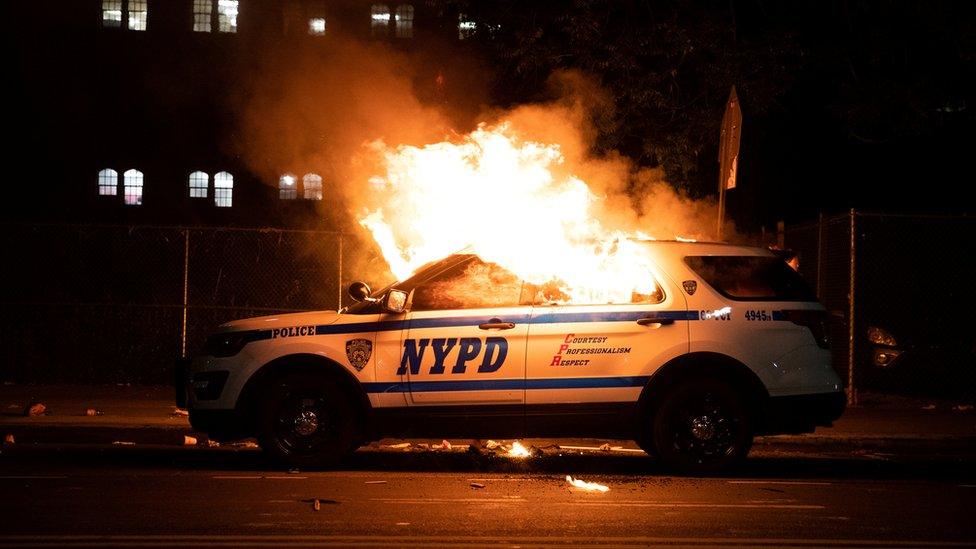
- Published26 December 2019
